
Updated 2024 Approved Best Video Title Generators

Best Video Title Generators
The ranking of videos in search results depends on the quality of their titles; making video title maker an essentiality. Similar to metadata, titles provide important information about your video, like its genre, subject, etc., to YouTube, Google, and TikTok viewers. The likelihood that the audience will locate and watch your film will rise if you provide the appropriate titles. To assist you in choosing which option will work best for you, we have included video title makers online in this post.
The process of making video titles may be laborious and time-consuming. However, not with the video title maker online free. You can utilize one of the title video makers online for free and your social media videos might rank higher and get more views altogether. But even when you know where to start, there are so many different factors that it may be perplexing. Fortunately, the fantastic video title generator provided in this post will make the process fast and simple.
Part 1. Tools to Generate Video Titles
1. TubeRanker Title Generator
A collection of YouTube SEO tools called TubeRanker may be used to optimize videos on Facebook, YouTube, and TikTok. Creators may utilize the short bursts of video title suggestions provided by the TubeRanker Title Generator in the names of their YouTube videos. Creators of videos may arrange and produce flawless, SEO-optimized video descriptions with the aid of the TubeRanker Video Description Generator. With the help of its title generator tool, TubeRanker can extract and display the meta tags connected to any public movie.
Steps to Use TubeRanker:
Step1 Visit the Website
In the first step, refer to the TubeRanker official website and you will be shown to the following UI. As a result, it’s a good idea to start with some keyword research instructions; you can read the TubeRanker title generator instructions to do so.
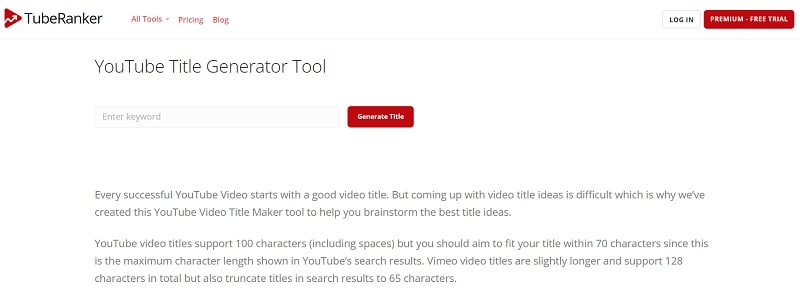
Step2 Launch the Title Generator
Your video’s ranking on search engine results pages in TubeRanker depends heavily on your keywords, which also assist viewers determine if the post is relevant to them. From the webpage, refer to the title generator as shown here:

Step3 Generate Video Title
Simply enter your keyword into the title generator and press the red button to complete this phase. You’ll see many titles as soon as you do that and begin reading the headlines. Write down the ones that make sense as you go down. Make a few minor edits to ensure that they are grammatically sound. Run a search using the niche and after that the automatically created titles are getting in the way as shown here:

Step4 Copy the Title (s)
After that, you’ll have a lot of options from which to choose. Some individuals push for names that are SEO-friendly, while others try for titles that are distinctive to stand out from the throng. maintain a careful balance. Both include a powerful keyword and making your title stand out should be your goals.
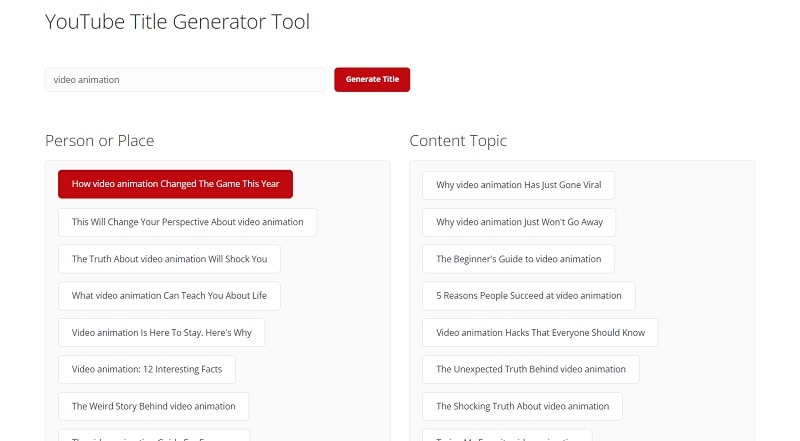
2. TunePocket Title Generator
For background music for your video and YouTube video SEO, TunePocket might be a top-notch tool. Additionally, the fact that it is free to use and that no account creation is necessary is beneficial. A stock music library, TunePocket provides a variety of music services. Additionally, we have discovered some incredible YouTube tools, such as YouTube tag generators. The fact that you can use this tag generator on YouTube without creating an account is what made us appreciate it even more.
Steps to Use TunePocket:
Step1 Visit the Website
The title generating procedure for your films may be started by first visiting the official TunePocket website, as illustrated here:
image name: visit-tunepocket.jpg
Step2 Launch the Title Generator
While on the webpage, you can refer to the YouTube title generator section. This will let you enter the topic of your video in the referred box as shown here:
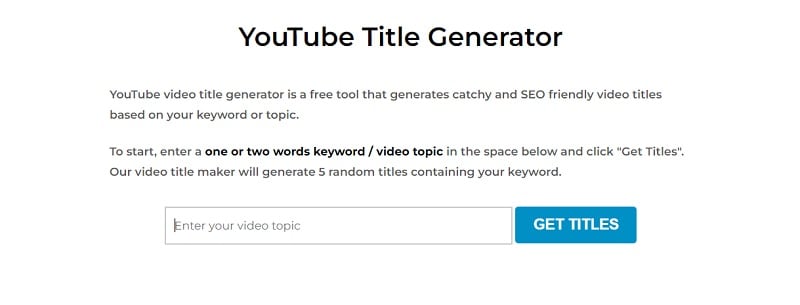
Step3 Generate Video Title
You may save a lot of time by using TunePocket title generator to create creative titles. Simply type in your target term, choose your desired region, and language, then click “Get Titles.” There will be a list of useful keywords returned by TunePocket. You can run again the generator in order to get the desired results. For that, click on the Run again button down the line as shown here:
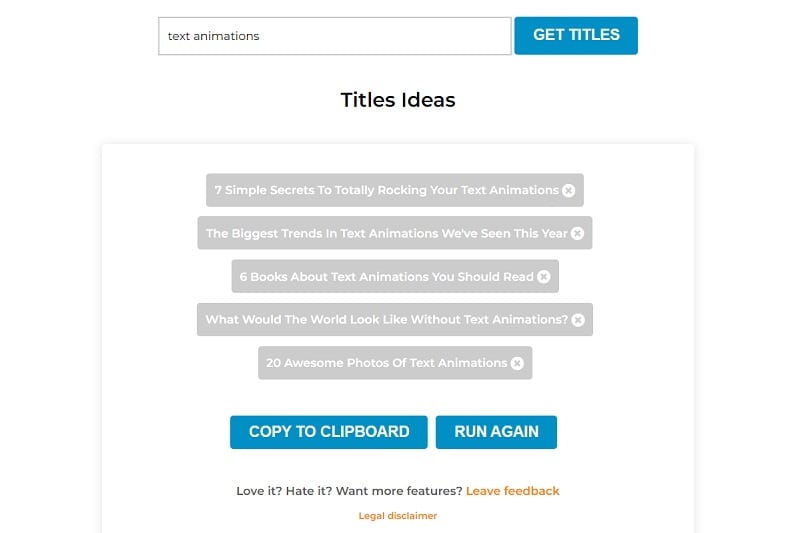
Step4 Copy the Title to Clipboard
A title generator may be processed in a matter of seconds and a few clicks. You don’t need to spend hours and hours coming up with numerous titles; you can copy more than one in a matter of minutes. Simply hit the Copy to Clipboard and get done with the title:
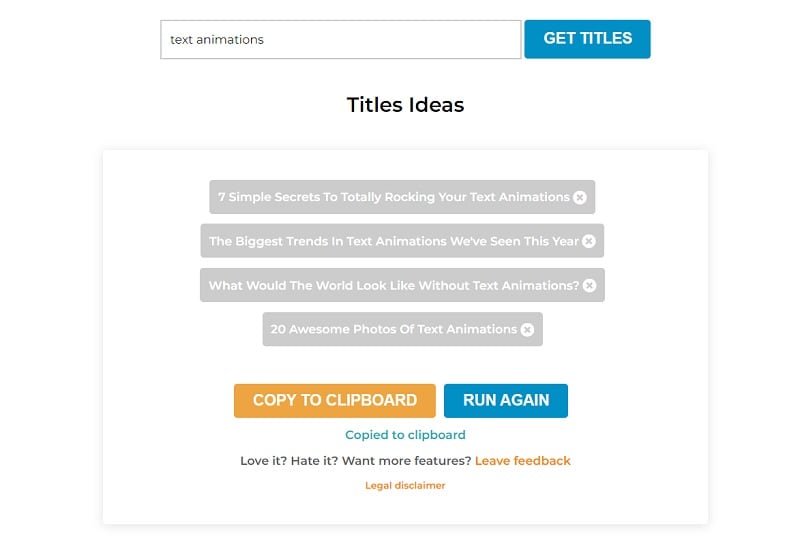
Part 2. Tips to Create Video Titles
Whether you’ve been video marketing for years or are just starting out, coming up with catchy video titles might be the most difficult aspect of the process. The title of a video has a significant role in whether or not viewers choose to click the play button, making it more than simply a minor feature. Poor titles make it difficult to attract views and expand your following, regardless of how fantastic your videos are. Here are the best scrutinized tips for creating best ranking titles for your videos:
1. Optimize the title using keywords for improved SEO
It might be difficult to come up with a title that is original, concise, and descriptive. However, a strong video title stays something original. Keywords are crucial for more than simply your website. They are important for video titles, too. If you want people to see your videos when they search for certain phrases, those keywords should be in the title because Google and YouTube can’t watch videos and grasp the content (yet).
2. Perfectly Match the Content
A excellent video title explains to viewers what to anticipate from the video. It’s unambiguous, straightforward, and sincere. Additionally, if you are familiar with your target demographic, you will be able to generate a lot more hits to your videos. Using a vague or confusing title is problematic as people are busy and need a reason to watch your movie. Similar to false content, misleading headlines deceive viewers and damage your reputation.
3. Attempt to pique interest
Keep in mind that compelling video titles are an art form that appeals to viewers’ emotions rather than being a precise SEO science. Try answering the questions on your own to get a catchy video title. People are more inclined to watch a video if you make reference to a secret or exceptional knowledge that you will disclose in it. Keep in mind that your goal is not to deceive viewers into viewing your video.
4. Increase the Click Through Rate
The finest titles are those that best expose the vulnerabilities of the reader. Consider it a little preview for your video. If you are creating a how-to or instructive video that answers a question or gives information, you may want to consider include the question in the title. It also makes it simple to think up video concept.
5. Attempt to utilize cue (triggering) words
Your title and description should both include your target keyword. You’ll probably start to generate some ideas for a real video title after you begin your keyword research. To determine how persuasive these concepts are, use a trigger analyzer. You’ll need to do study in order to accomplish this. As for the knowledge gap, consider how your target audience would respond.
The Bottom Line
In this article, we’ve compiled a list of the best tag generators for videos, including everything from video names and descriptions to titles, thumbnail design elements, and video ideas. You may get some useful tips as well for creating the greatest video titles by using this guide to the video title generator to obtain the ideal title for your social media videos. Find out the best suitable video title maker online free in the post above and tweak your video titles for social platforms rankings.
Free Download For Win 7 or later(64-bit)
Free Download For macOS 10.14 or later
1. TubeRanker Title GeneratorA collection of YouTube SEO tools called TubeRanker may be used to optimize videos on Facebook, YouTube, and TikTok. Creators may utilize the short bursts of video title suggestions provided by the TubeRanker Title Generator in the names of their YouTube videos. Creators of videos may arrange and produce flawless, SEO-optimized video descriptions with the aid of the TubeRanker Video Description Generator. With the help of its title generator tool, TubeRanker can extract and display the meta tags connected to any public movie.
Steps to Use TubeRanker:
Step1 Visit the Website
In the first step, refer to the TubeRanker official website and you will be shown to the following UI. As a result, it’s a good idea to start with some keyword research instructions; you can read the TubeRanker title generator instructions to do so.

Step2 Launch the Title Generator
Your video’s ranking on search engine results pages in TubeRanker depends heavily on your keywords, which also assist viewers determine if the post is relevant to them. From the webpage, refer to the title generator as shown here:

Step3 Generate Video Title
Simply enter your keyword into the title generator and press the red button to complete this phase. You’ll see many titles as soon as you do that and begin reading the headlines. Write down the ones that make sense as you go down. Make a few minor edits to ensure that they are grammatically sound. Run a search using the niche and after that the automatically created titles are getting in the way as shown here:

Step4 Copy the Title (s)
After that, you’ll have a lot of options from which to choose. Some individuals push for names that are SEO-friendly, while others try for titles that are distinctive to stand out from the throng. maintain a careful balance. Both include a powerful keyword and making your title stand out should be your goals.

2. TunePocket Title Generator
For background music for your video and YouTube video SEO, TunePocket might be a top-notch tool. Additionally, the fact that it is free to use and that no account creation is necessary is beneficial. A stock music library, TunePocket provides a variety of music services. Additionally, we have discovered some incredible YouTube tools, such as YouTube tag generators. The fact that you can use this tag generator on YouTube without creating an account is what made us appreciate it even more.
Steps to Use TunePocket:
Step1 Visit the Website
The title generating procedure for your films may be started by first visiting the official TunePocket website, as illustrated here:
image name: visit-tunepocket.jpg
Step2 Launch the Title Generator
While on the webpage, you can refer to the YouTube title generator section. This will let you enter the topic of your video in the referred box as shown here:

Step3 Generate Video Title
You may save a lot of time by using TunePocket title generator to create creative titles. Simply type in your target term, choose your desired region, and language, then click “Get Titles.” There will be a list of useful keywords returned by TunePocket. You can run again the generator in order to get the desired results. For that, click on the Run again button down the line as shown here:

Step4 Copy the Title to Clipboard
A title generator may be processed in a matter of seconds and a few clicks. You don’t need to spend hours and hours coming up with numerous titles; you can copy more than one in a matter of minutes. Simply hit the Copy to Clipboard and get done with the title:

Part 2. Tips to Create Video Titles
Whether you’ve been video marketing for years or are just starting out, coming up with catchy video titles might be the most difficult aspect of the process. The title of a video has a significant role in whether or not viewers choose to click the play button, making it more than simply a minor feature. Poor titles make it difficult to attract views and expand your following, regardless of how fantastic your videos are. Here are the best scrutinized tips for creating best ranking titles for your videos:
1. Optimize the title using keywords for improved SEO
It might be difficult to come up with a title that is original, concise, and descriptive. However, a strong video title stays something original. Keywords are crucial for more than simply your website. They are important for video titles, too. If you want people to see your videos when they search for certain phrases, those keywords should be in the title because Google and YouTube can’t watch videos and grasp the content (yet).
2. Perfectly Match the Content
A excellent video title explains to viewers what to anticipate from the video. It’s unambiguous, straightforward, and sincere. Additionally, if you are familiar with your target demographic, you will be able to generate a lot more hits to your videos. Using a vague or confusing title is problematic as people are busy and need a reason to watch your movie. Similar to false content, misleading headlines deceive viewers and damage your reputation.
3. Attempt to pique interest
Keep in mind that compelling video titles are an art form that appeals to viewers’ emotions rather than being a precise SEO science. Try answering the questions on your own to get a catchy video title. People are more inclined to watch a video if you make reference to a secret or exceptional knowledge that you will disclose in it. Keep in mind that your goal is not to deceive viewers into viewing your video.
4. Increase the Click Through Rate
The finest titles are those that best expose the vulnerabilities of the reader. Consider it a little preview for your video. If you are creating a how-to or instructive video that answers a question or gives information, you may want to consider include the question in the title. It also makes it simple to think up video concept.
5. Attempt to utilize cue (triggering) words
Your title and description should both include your target keyword. You’ll probably start to generate some ideas for a real video title after you begin your keyword research. To determine how persuasive these concepts are, use a trigger analyzer. You’ll need to do study in order to accomplish this. As for the knowledge gap, consider how your target audience would respond.
The Bottom Line
In this article, we’ve compiled a list of the best tag generators for videos, including everything from video names and descriptions to titles, thumbnail design elements, and video ideas. You may get some useful tips as well for creating the greatest video titles by using this guide to the video title generator to obtain the ideal title for your social media videos. Find out the best suitable video title maker online free in the post above and tweak your video titles for social platforms rankings.
Free Download For Win 7 or later(64-bit)
Free Download For macOS 10.14 or later
How To Quickly Create A Screen Print Effect In Photoshop: Detailed Gui
Screen printing is a unique method that uses a mesh to transfer ink onto a surface and is commonly used to print designs onto t-shirts or other garments, such as hoodies, tote bags, and even sneakers.
Nowadays, digital means such as Photoshop or Illustrator are used to create the screen print effect, which is achieved by using a layer mask to cut out a portion of the image and filling it with the color or pattern of your choice. The design is then printed onto fabric using water-based CMYK (cyan, magenta, yellow, black) inks with inkjet printers.
Suppose you’ve ever wanted to create the screen print effect in Photoshop to give that artistic look to your pictures and embed them in your clothes or other accessories but don’t know where to start or are not familiar with the process. In that case, this guide can surely help you figure this out quickly!
So without any delay, let’s get on with it!
How To Use Photoshop To Create The Print Effect
Below we’ve provided a detailed guide using Adobe Photoshop to create the print effect with easy step-by-step instructions.
What Are The Requirements For Creating the Print Effect In PhotoShop?
Before we discuss the complete process of creating the print effect while using Photoshop, here are the resources you have to arrange.
- Picture of the object: We will cut out the object from the original image using the Lasso tool and unsaturate it. However, you have to ensure that the object is clear and easily detectable within the picture.
- A background image: You will need a background image to add the object to. For this, you can use a solid background, capture scenery, etc.
- Fonts: You can also add fonts to the final image to add your ideas or thoughts, making your final project more eye-catching and engaging.
- Photoshop latest version: For this tutorial, we will use the Photoshop CC 2021 version, so make sure to download and install it to your computer immediately!
What Are The Steps To Create Print Effect in PhotoShop?
Now that you know the necessary resources, the following are the steps to create the print effect in Photoshop:
Step1 Launch the Photoshop program on your laptop/desktop and click “Create New” on the software dashboard. Next, select the page size, such as “letter,” and click “Open.”
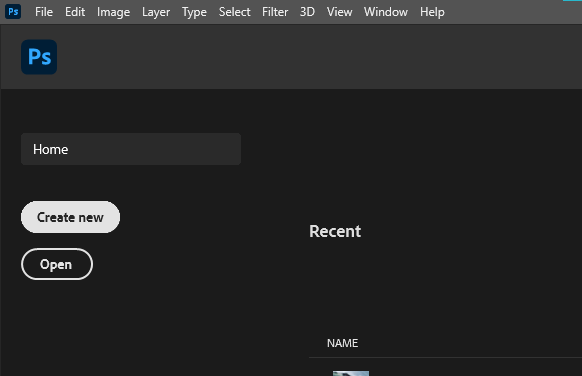
Now, click the “File” option in the top toolbar, and from the drop-down menu, select “Open.” Next, choose the image you want to apply the screen print effect by browsing to its location on your computer.
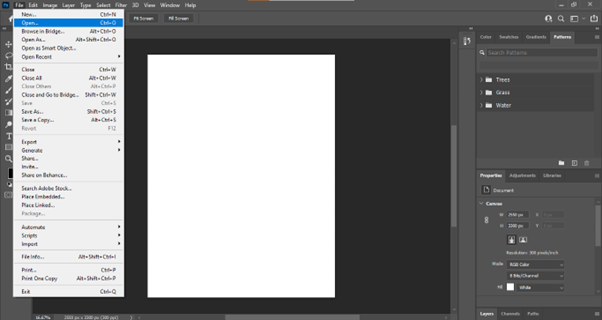
Step2 Next, click the “Lasso” tool from the left-side menu to create the selection around the object in the image.
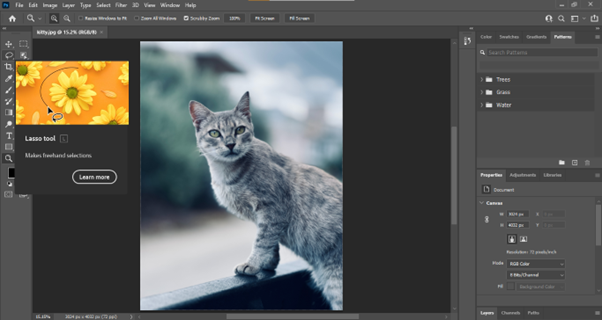
Press the CMD/Ctrl + C on your computer’s keyboard to copy the selection. Next, click the “Layer“ option in the top toolbar, select “New,” and click “Layer via Copy.”
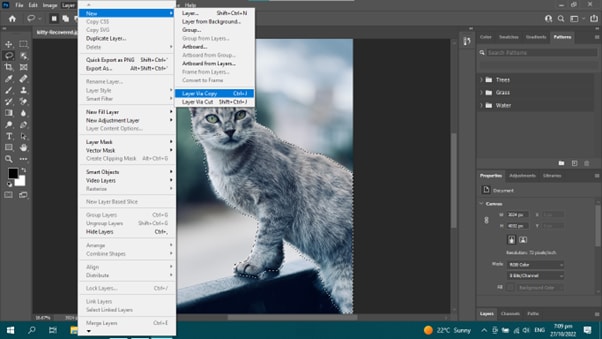
Step3 Now, hide the background layer in the “Layers” panel on the right-hand side, and you will get your object without any BG. Click the “Image” option in the top toolbar and select “Adjustments.”
Click “Threshold…” from the drop-down menu, and set the “Threshold level.” Alternatively, you can click “Cmd/ctrl+Shift+U” on the keyboard to desaturate the image.
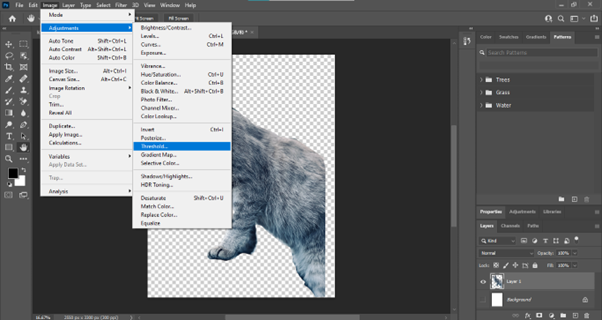
Step4 Next, select the “Magic Eraser Tool” from the left-side menu and remove the white parts to smooth down the background. Afterward, choose the “Move Tool” from the menu and drag your object to a new layer.
To add the background image, click “File” and select “Open.” Next, select the file and again click “Open.”
Step5 Select the object using the “Move Tool” and drag it to the background image layer. If the thing is too large and you want to resize it, select the object using the “CMD/Ctrl” key and click “Edit” from the top toolbar. From the drop-down menu, choose “Transform” and click “Scale.”
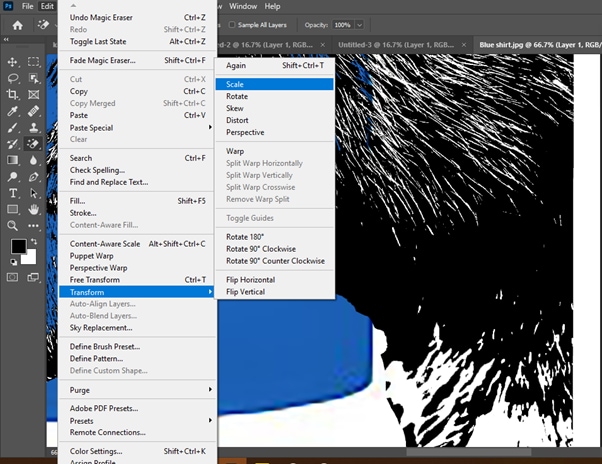
Next, drag the handles to adjust the size of the object on the Background image.
Step6 Click the “T” icon from the left-hand side menu and set the font style, color, and size. You can also click the “3D” option to convert your text to a three-dimensional form.
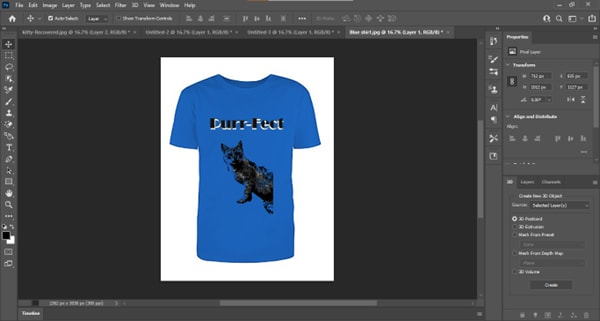
Try removing the left-out white patches on the object using the “Magic Eraser Tool” to give a polished look to the print screen effect. Once you are satisfied, click the “File” option from the top toolbar panel and select “Save As.”
Type in the file name and select the file type from the drop-down menu next to “Save As Type.” Choose the storage location, click “Save” to export your final project, and you’re done!
Conclusion
In this article, we’ve explored what the screen print effect is and how it is used in digital art. We’ve also discussed the requirements and resources you need to use and then demonstrated a step-by-step process of how to create the screen print effect in Photoshop with simple and easy-to-follow instructions.
To make things easy for you, we also added original screenshots while creating a sample project on the software.
Hopefully, this article helped resolve your queries, and you can now give a vintage or retro look to your images using the screen print effect in Photoshop.
Free Download For Win 7 or later(64-bit)
Free Download For macOS 10.14 or later
Free Download For macOS 10.14 or later
What Is HDRI? Everything You Need to Know About HDRI
Photography is like art itself. Photographers must carefully select the setting and use the right camera to capture images with lossless quality. However, you’ll realize that some photos appear darker or brighter than in actual life.
In that case, use free HDRI software to change that straightway. But HDRI being a relatively new technique, beginners might struggle to edit the photos, let alone find the perfect HDRI software.
So, in this simple guidepost, we’ll learn how to create an HDRI 3D picture using HDRI for Blender. But first, let’s understand what an HDRI file is and the difference between HDRI and HDR.
Part 1: What is HDRI?
HDRI (High Dynamic Range Image) is simply an image created using multiple image overlays of the same background but with varying exposures. The exposures can range from the brightest highlights to the darkest shadows. So, in short, HDRI expands an image’s dynamic range to brighten or darken it and make it look more natural.
Having said that, HDRI is a raster image created using color pixels. HDRI photos are generally significant in size, so they won’t quickly lose quality like other raster photos such as PNG and JPG. Many formats can store HDRI images, although the most common are OpenEXR (.exr) and Radiance RGBE (.hdr).
Pros
- You can easily create one using HDRI for Blender, Photoshop, EasyHDRI, etc.
- HDRI photos are compatible with many image editing programs.
- Produces crisp images with excellent detail and lighting control.
Cons
- 32-bit HDRI files have significant sizes.
- HDRI can quickly be poorly done without prior experience.
Part 2: What’s the difference between HDR and HDRI
According to Wikipedia, HDR and HDRI are the same things. But is it true? For starters, HDRI is basically a photo with High Dynamic Range qualities. So, yes, HDR and HDRI can mean the same thing in digital image editing.
However, some photo editors argue that there is a difference between these two regarding basic workflow. First, HDR technology increases brightness to show more image details. On the other hand, HDRI performs unique optimization of content and lighting to deliver crisp images. In other words, HDRI brightens the dark shadows without necessarily overexposing the bright image areas.
Some photographers can also consider HDR as images with pixel values higher than 1 or 255. That means that the pixels can be much higher than pure white. But technically speaking, HDR and HDRI can be used interchangeably.
Part 3: When to use HDRI
Now that you have all the information about HDRI, let’s learn about some industries where HDRI is applicable.
1. HDRI for 3D visualization and 3D animation
HDRI 3D is commonplace these days. 3D animation creators can use programs like HDRI Blender to add HDR environments and make the content look detailed and more realistic in high lighting reflections. To put it simply, HDRI makes 3D scenes look lighter, less cartoonish, and more professional. This technology can also be used in interior visualizations in animations.
2. HDRI for architect rendering
Creating HDRI environments is a common practice in 3D architectural designs. For example, designers can create panoramic house designs with varying light tones and interior moods. HDRI helps them give a natural 3D lighting effect on scenes and objects.
3. HDRI monitors and TVs
You’ve probably heard of HDRI 4K when shopping for a smart TV or computer monitor. These TVs offer a lot more than just a wide color gamut, high brightness, and advanced contrast ratio. In addition, HDR TVs and monitors can recognize HDR signals, allowing viewers to watch the content with all studio quality. In short, viewers can see more color details in shadowy and lighter scenes, making them perfect for avid gamers.
Part 4: How do you open an HDRI?
Because HDRIs use low dynamic range rendering, a standard display panel won’t open HDR images. So, to open an HDRI file on a non-HDR display, you’ll need to convert it to a different low dynamic range format using tone mapping technology. For example, you convert HDRI to JPEG or PNG and enjoy regular bitmaps while maintaining the HDRI properties. You can also open and edit HDRI using desktop programs like EasyHDR, Photoshop, and Blender.
Part 5: How to set up an HDR environment background?
Before wrapping up this blog post, let’s discuss how to use HDRI for Blender to apply HDR effects to an image’s background. Blender is a 100% free program for creating jaw-dropping 3D rendering and animations on Mac and Windows computers. With Blender, you’ll get an advanced modeling toolset like retopology, curves, sculpting, and more. But in this post, we’ll learn how to create an HDR environment or add lighting to your image project. Let’s get started!
Step1Install and run Blender and then tap the World Properties tab. Then, click the Color icon and add Environment Texture.
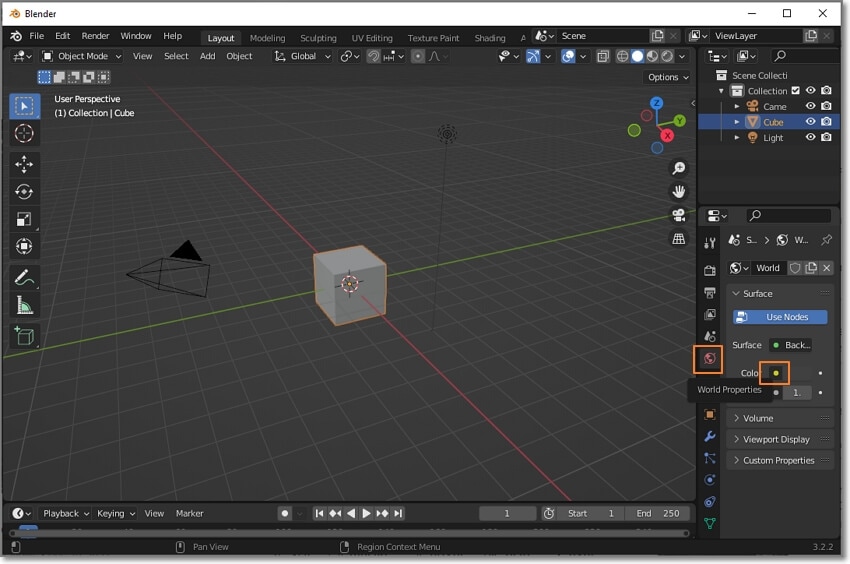
Step2Next, split the window into two and launch the Shader Editor tool. Then, open the Object drop-down menu at the top-left corner and choose World. You’ll see the Environment Texture hooked into the background.
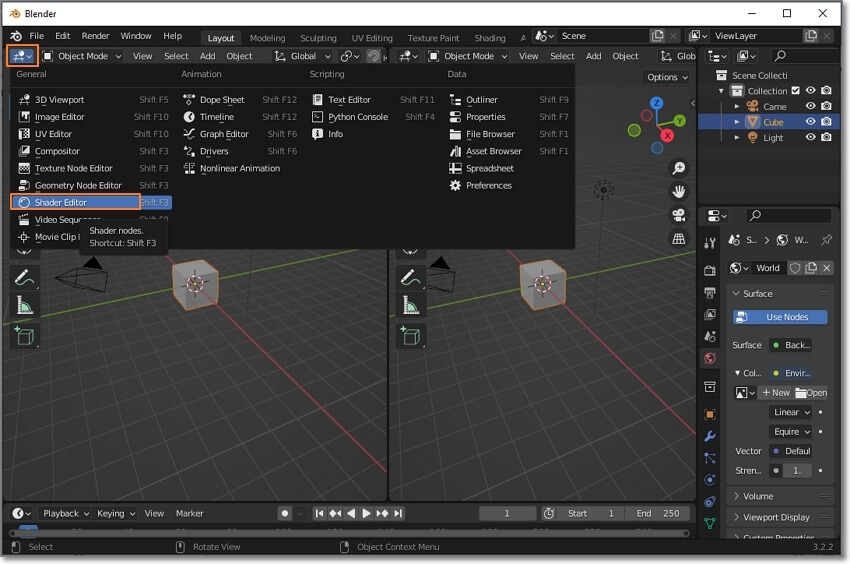
Step3On the Environment Texture, tap Open Image before opening the 3.2 folder inside the Blender Foundation folder. Then, click Data files > Studiolights > Word. Now open a .exr file. For example, open the Interior.exr image.
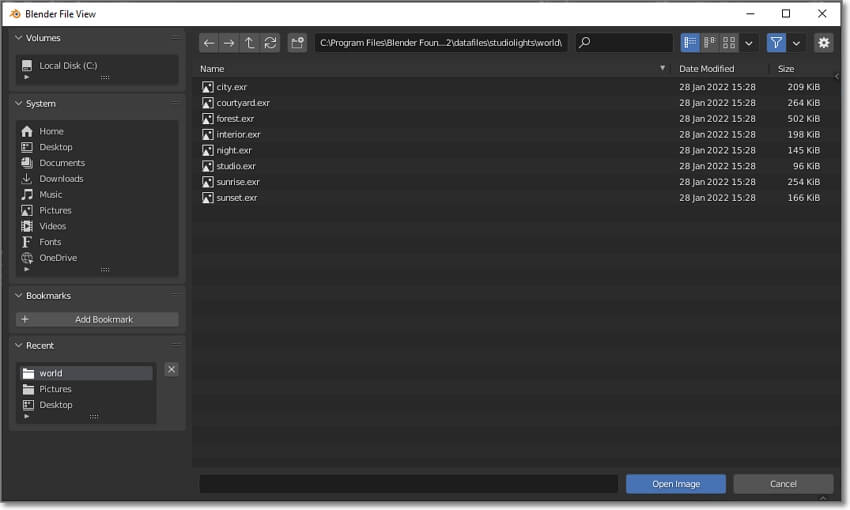
Step4Click the Viewport Shading icon and tap the drop-down button to choose Interior. You’ll see all the lighting reflections inside the room and customize it as you wish. That’s it!
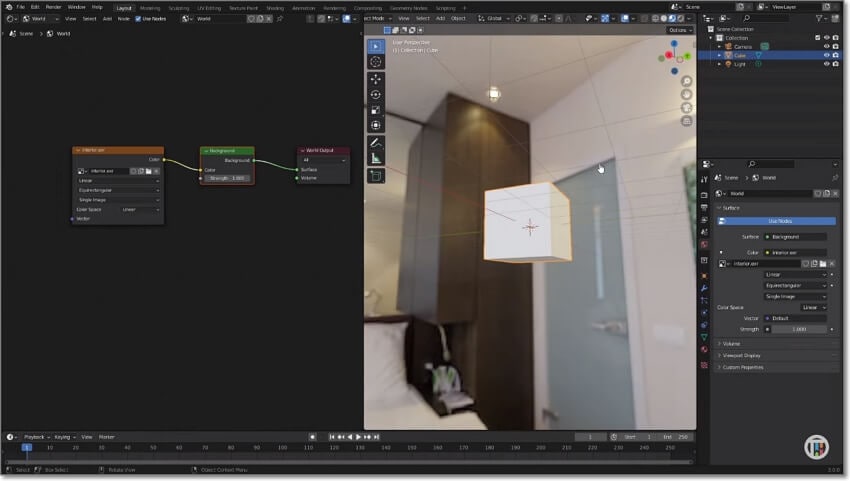
Conclusion
Using the environment maps is the simplest and most effective way to lighten up your 3D scenes in Blender. This program lets you achieve realistic 3D scenes, mimicking natural world lighting. But note that Blender can be a little confusing for beginners. So, play around with this HDRI tool, and you’ll be a pro in no time.
Free Download For Win 7 or later(64-bit)
Free Download For macOS 10.14 or later
Part 2: What’s the difference between HDR and HDRI
According to Wikipedia, HDR and HDRI are the same things. But is it true? For starters, HDRI is basically a photo with High Dynamic Range qualities. So, yes, HDR and HDRI can mean the same thing in digital image editing.
However, some photo editors argue that there is a difference between these two regarding basic workflow. First, HDR technology increases brightness to show more image details. On the other hand, HDRI performs unique optimization of content and lighting to deliver crisp images. In other words, HDRI brightens the dark shadows without necessarily overexposing the bright image areas.
Some photographers can also consider HDR as images with pixel values higher than 1 or 255. That means that the pixels can be much higher than pure white. But technically speaking, HDR and HDRI can be used interchangeably.
Part 3: When to use HDRI
Now that you have all the information about HDRI, let’s learn about some industries where HDRI is applicable.
1. HDRI for 3D visualization and 3D animation
HDRI 3D is commonplace these days. 3D animation creators can use programs like HDRI Blender to add HDR environments and make the content look detailed and more realistic in high lighting reflections. To put it simply, HDRI makes 3D scenes look lighter, less cartoonish, and more professional. This technology can also be used in interior visualizations in animations.
2. HDRI for architect rendering
Creating HDRI environments is a common practice in 3D architectural designs. For example, designers can create panoramic house designs with varying light tones and interior moods. HDRI helps them give a natural 3D lighting effect on scenes and objects.
3. HDRI monitors and TVs
You’ve probably heard of HDRI 4K when shopping for a smart TV or computer monitor. These TVs offer a lot more than just a wide color gamut, high brightness, and advanced contrast ratio. In addition, HDR TVs and monitors can recognize HDR signals, allowing viewers to watch the content with all studio quality. In short, viewers can see more color details in shadowy and lighter scenes, making them perfect for avid gamers.
Part 4: How do you open an HDRI?
Because HDRIs use low dynamic range rendering, a standard display panel won’t open HDR images. So, to open an HDRI file on a non-HDR display, you’ll need to convert it to a different low dynamic range format using tone mapping technology. For example, you convert HDRI to JPEG or PNG and enjoy regular bitmaps while maintaining the HDRI properties. You can also open and edit HDRI using desktop programs like EasyHDR, Photoshop, and Blender.
Part 5: How to set up an HDR environment background?
Before wrapping up this blog post, let’s discuss how to use HDRI for Blender to apply HDR effects to an image’s background. Blender is a 100% free program for creating jaw-dropping 3D rendering and animations on Mac and Windows computers. With Blender, you’ll get an advanced modeling toolset like retopology, curves, sculpting, and more. But in this post, we’ll learn how to create an HDR environment or add lighting to your image project. Let’s get started!
Step1Install and run Blender and then tap the World Properties tab. Then, click the Color icon and add Environment Texture.

Step2Next, split the window into two and launch the Shader Editor tool. Then, open the Object drop-down menu at the top-left corner and choose World. You’ll see the Environment Texture hooked into the background.

Step3On the Environment Texture, tap Open Image before opening the 3.2 folder inside the Blender Foundation folder. Then, click Data files > Studiolights > Word. Now open a .exr file. For example, open the Interior.exr image.

Step4Click the Viewport Shading icon and tap the drop-down button to choose Interior. You’ll see all the lighting reflections inside the room and customize it as you wish. That’s it!

Conclusion
Using the environment maps is the simplest and most effective way to lighten up your 3D scenes in Blender. This program lets you achieve realistic 3D scenes, mimicking natural world lighting. But note that Blender can be a little confusing for beginners. So, play around with this HDRI tool, and you’ll be a pro in no time.
Free Download For Win 7 or later(64-bit)
Free Download For macOS 10.14 or later
How to Create the Stranger Things Upside Down Effect
With stranger things season 4 ending, it seems like great timing to make a stranger things style transition to the Upside Down. In the Netflix series Stranger Things, there is an opposite version of our world called the Upside Down. The Upside Down is dark, creepy, and possibly filled with aliens, monsters, creatures, and other things.
Now, you can also apply the Stranger Things Upside Down Effect to your video! This effect combines camera tricks and video editing within Filmora to transition from the normal world into the Upside Down.
How-to Guide
1) Preparation
To make this effect, you will need two footage shots: one with the camera moving down and one with the camera coming back up.
When shooting for the footage, follow the steps below:
First shot
- Find any item close enough to the ground that we can block our frame with.
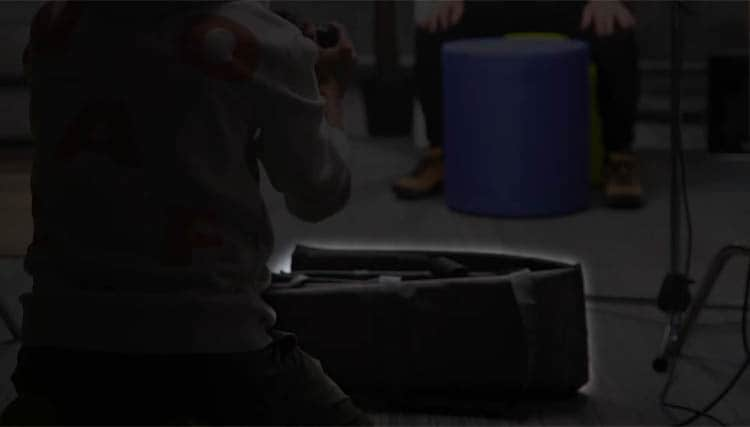
- Once you have your talent lined up, rotate your camera while lowering it below the foreground item at a constant speed and leaving the camera there. The key is making sure when you go behind the object, the frame is nothing but black.
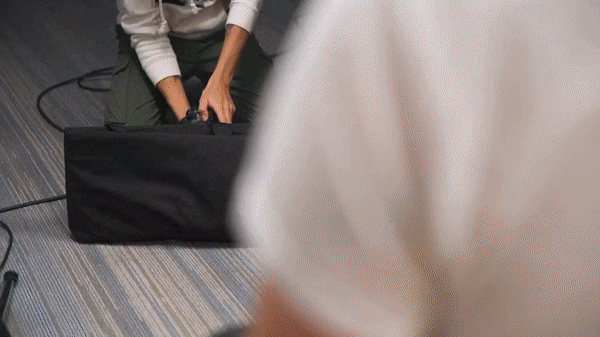
For the next scene, have your actor change positions, or you can change the set around to look like the Upside Down. For instance, adding fake plants and flickering lights.
Second shot
Start bringing your camera back up at the same speed and rotate it again in the direction it was moving.
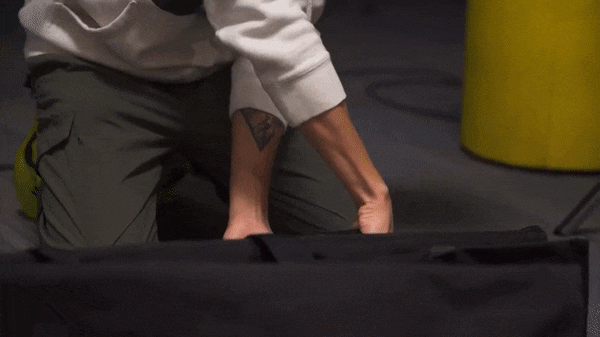
2) Steps
After you have all the footage, you can start editing it on Filmora. If you haven’t installed it yet, you can download Filmora at their official website at https://filmora.wondershare.com .
Free Download For Win 7 or later(64-bit)
Free Download For macOS 10.14 or later
Now, launch Filmora on your PC and follow the steps below:
Step1 Take your first clip in the “normal” world and drag it down to a video track on the timeline. Trim the edge of the clip, so it ends on pure black and in a downward motion.
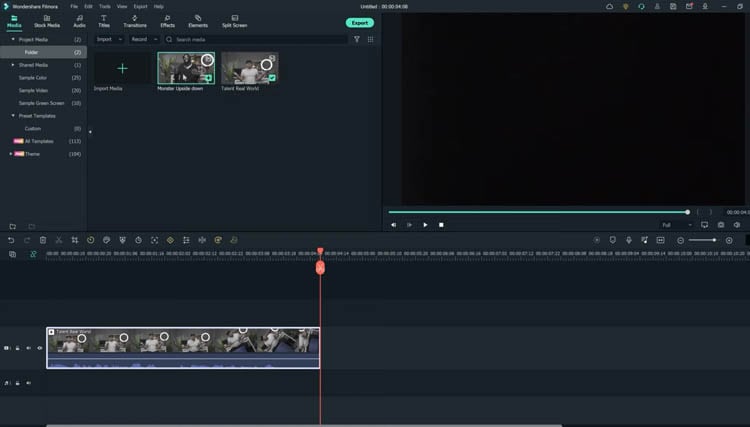
Step2 Drag the second clip (in the Upside Down) onto the video track on the timeline after the first clip. Trim this video, so it begins in pure black and an upward motion.
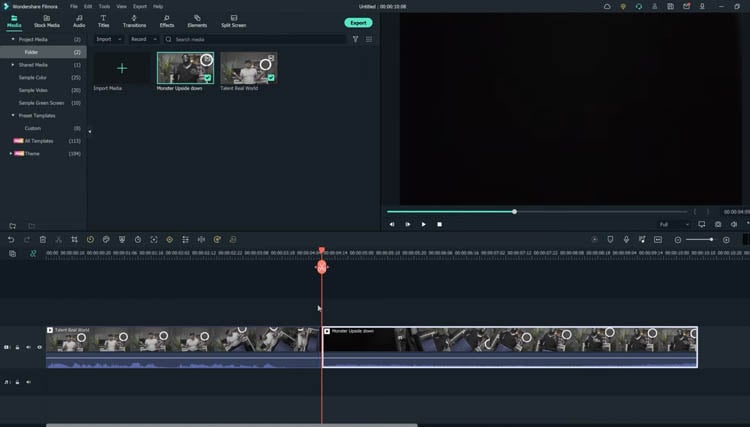
Cut the clips to get the timing right since it should be a very fast transition. You can cut in the black frames so they won’t be too apparent.
If you don’t have a perfectly smooth transition, you can add a dissolve by going to Transitions > Basic > Dissolve.
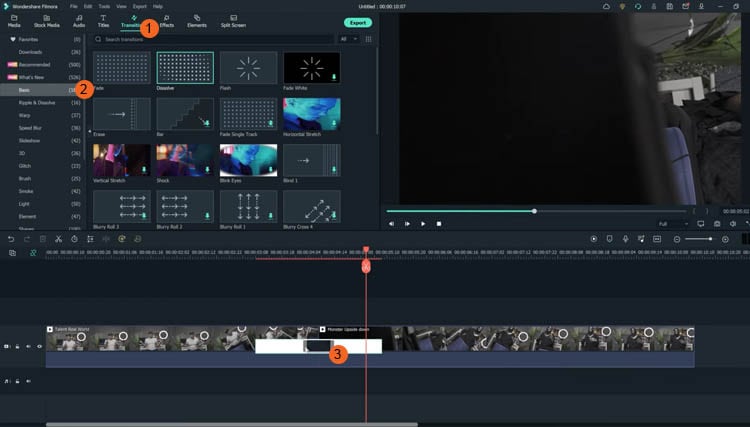
Color Grading and Effects
After the transition, you can make the clip look a lot more like the Upside Down from the show with a color grade and Filmora effects. Follow the steps below:
Step1 Double-click on your second clip, then go to Color > Advanced. For a quick edit, you can try one of the presets available, such as “cool film.” It will give you the colder blue tones that Stranger Things used for the Upside Down.
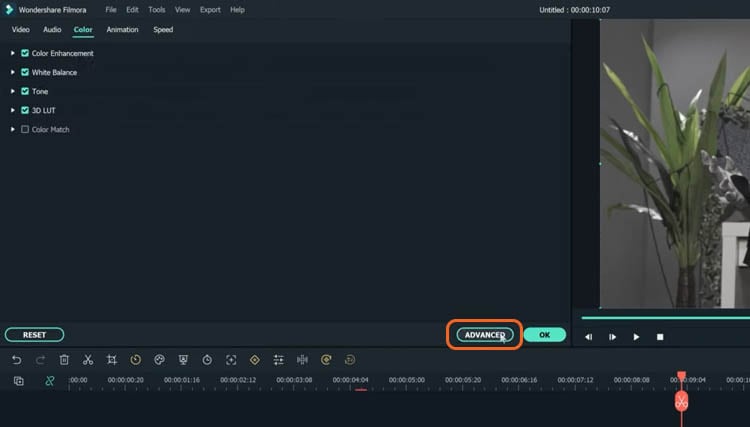
Step2 You can further edit the color grading in the white balance menu. Drag the slider to the left to get a blue, cold vibe for the Upside Down.
The “cool” or “warm” color grading technically talks about color temperature. A “warmer” look will be more orange, and a “colder” look will be bluer. You can also use the tint slider to fine-tune the look.
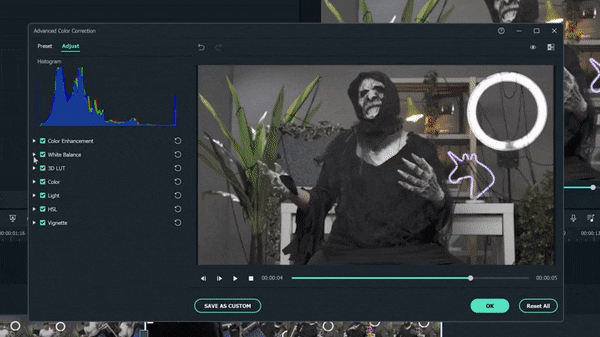
Step3 Next, move down to the color, lower the brightness and increase contrast. It makes the scene darker and more sinister than the normal world.
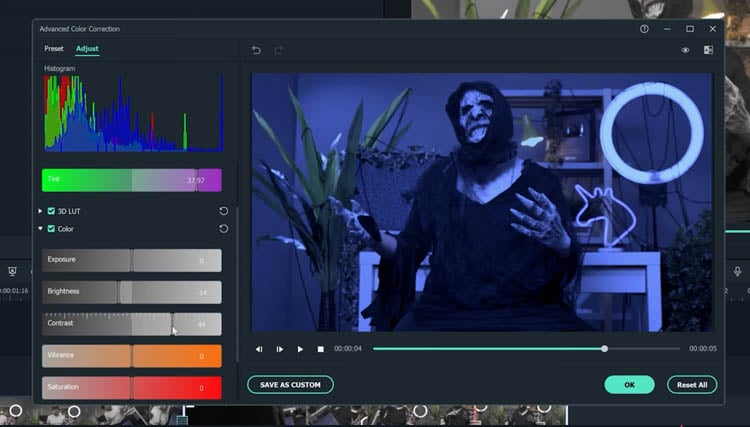
Step4 Finally, go down to the vignette and drag the amount slider a tiny bit to give a Vinnette around your clip.
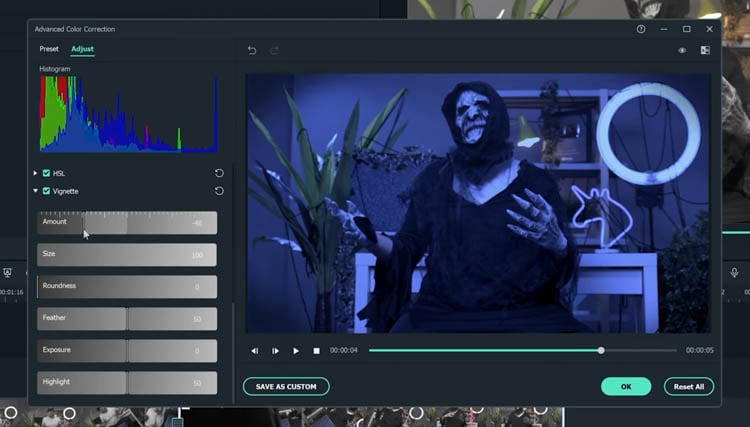
3) Pro Tips
You can still make your clip look even more like Upside Down with some Filmora elements.
Go to Elements > Smoke > Smokescreen 2. Drag this element on top of your Upside Down clip and trim it, so it starts at the same time the clip leaves the black frame.
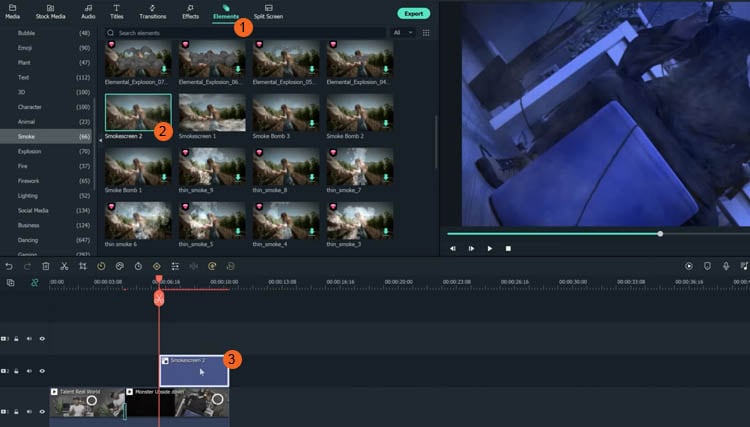
You can adjust the opacity by double-clicking the smoke effect to open the setting.
Finally, go to the Transition > Basic > Dissolve to the start of the smoke and adjust it when the smoke gradually appears.
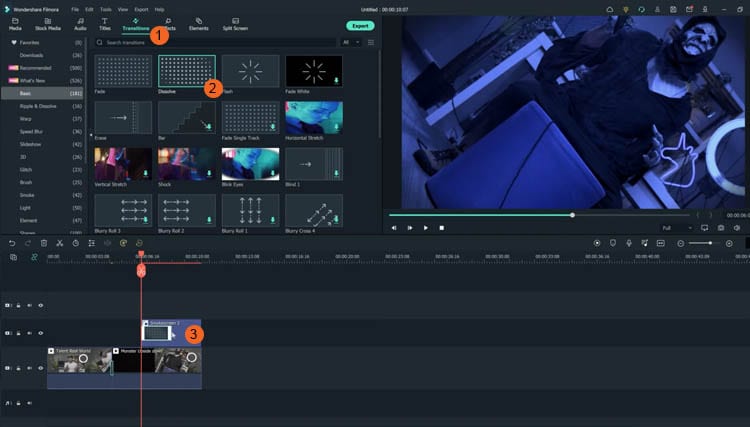
Resources from Filmostock
You can also use filmstock effects to bring our video to the next level. Go to Elements > Fire > Large Scale 12 and drag it down on top of your clip and the smoke.
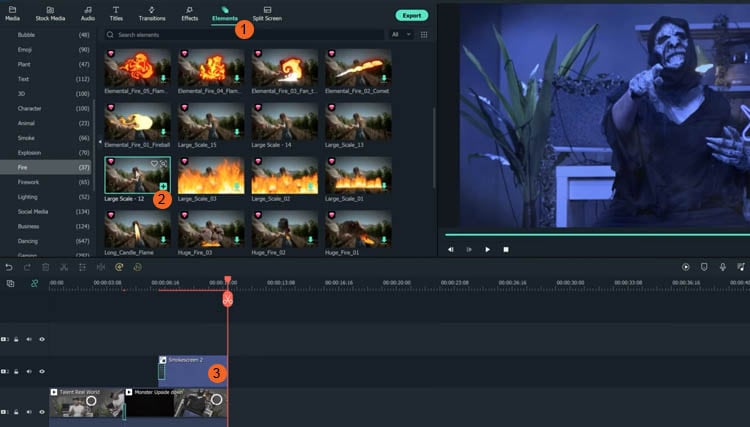
Double-click the clip and change the scale of the effect to your needs. Then, go to compositing to change the blending mode to the screen to help the effect blend in more.
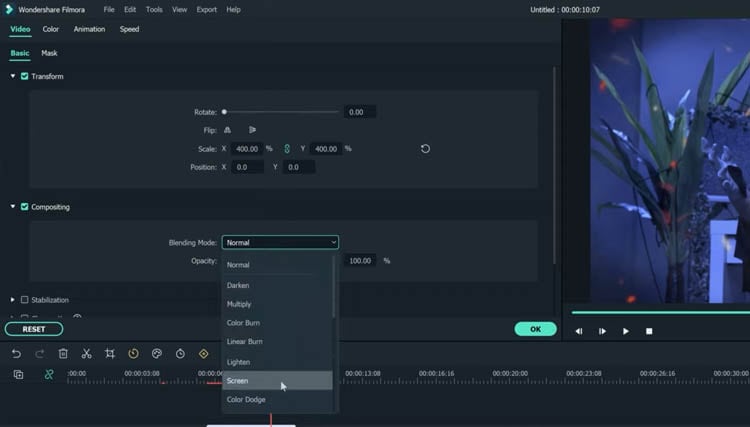
Now, go to color and open the white balance menu. Drag the two sliders to change the color of the particles to match your clip.
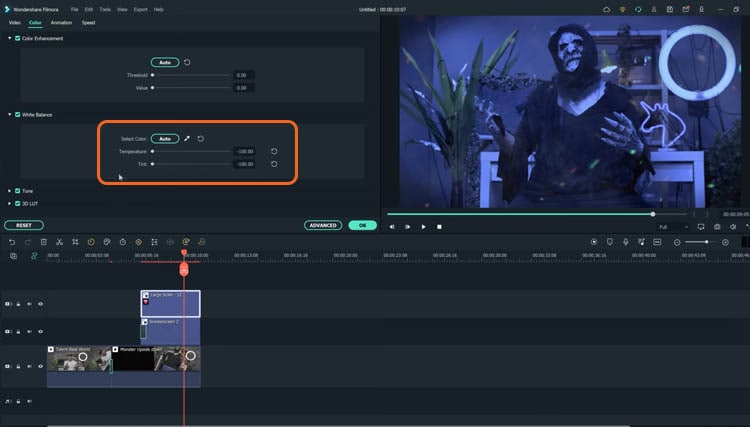
Summary
That is all you need to make a Stranger Things Upside Down effects to your video. Let us know if there are any other effects from tv shows you want to learn how to make.
Free Download For macOS 10.14 or later
Now, launch Filmora on your PC and follow the steps below:
Step1 Take your first clip in the “normal” world and drag it down to a video track on the timeline. Trim the edge of the clip, so it ends on pure black and in a downward motion.

Step2 Drag the second clip (in the Upside Down) onto the video track on the timeline after the first clip. Trim this video, so it begins in pure black and an upward motion.

Cut the clips to get the timing right since it should be a very fast transition. You can cut in the black frames so they won’t be too apparent.
If you don’t have a perfectly smooth transition, you can add a dissolve by going to Transitions > Basic > Dissolve.

Color Grading and Effects
After the transition, you can make the clip look a lot more like the Upside Down from the show with a color grade and Filmora effects. Follow the steps below:
Step1 Double-click on your second clip, then go to Color > Advanced. For a quick edit, you can try one of the presets available, such as “cool film.” It will give you the colder blue tones that Stranger Things used for the Upside Down.

Step2 You can further edit the color grading in the white balance menu. Drag the slider to the left to get a blue, cold vibe for the Upside Down.
The “cool” or “warm” color grading technically talks about color temperature. A “warmer” look will be more orange, and a “colder” look will be bluer. You can also use the tint slider to fine-tune the look.

Step3 Next, move down to the color, lower the brightness and increase contrast. It makes the scene darker and more sinister than the normal world.

Step4 Finally, go down to the vignette and drag the amount slider a tiny bit to give a Vinnette around your clip.

3) Pro Tips
You can still make your clip look even more like Upside Down with some Filmora elements.
Go to Elements > Smoke > Smokescreen 2. Drag this element on top of your Upside Down clip and trim it, so it starts at the same time the clip leaves the black frame.

You can adjust the opacity by double-clicking the smoke effect to open the setting.
Finally, go to the Transition > Basic > Dissolve to the start of the smoke and adjust it when the smoke gradually appears.

Resources from Filmostock
You can also use filmstock effects to bring our video to the next level. Go to Elements > Fire > Large Scale 12 and drag it down on top of your clip and the smoke.

Double-click the clip and change the scale of the effect to your needs. Then, go to compositing to change the blending mode to the screen to help the effect blend in more.

Now, go to color and open the white balance menu. Drag the two sliders to change the color of the particles to match your clip.

Summary
That is all you need to make a Stranger Things Upside Down effects to your video. Let us know if there are any other effects from tv shows you want to learn how to make.
Also read:
- All You Need To Know About Mega Greninja For OnePlus 11R | Dr.fone
- Elan Touchpad Driver Issues in Windows 10 [Solved]
- Fixing Your iPhone's Non-Functional Light Beam: Top 12 Strategies
- Harnessing the Power of ChatGPT: A Deep Dive Into Its Instruction Tailoring Capabilities
- HP LaserJet P1007 Driver Download | HP Printer Driver Update
- New 2024 Approved Seamlessly Combining Music and Movement in Windows Gif Files
- New If You Want an App to Make Videos with Pictures and Music for Social Media Posts, We Are with the Best Apps to Make Videos with Music and Pictures for 2024
- New In 2024, Are You Looking for a Video Format Converter Free? We Will Introduce the 5 Best Online Converters and Also the 5 Best Video Format Converters for PC
- New In 2024, Do You Want to Excel at Using Adobe Premiere Pro Software for Splitting Videos and Audio? Learn About Splitting a Video and Audio Using Different Tools and Add a New Skill to Your Skillset with a Step-by-Step Guide in This Article
- New In 2024, Wondering How to Create a Stunning Intro Video with KineMaster? Here Are the Simple Steps to Use KineMaster to Design Your Intro Video in Simple Steps
- New This Article Aims to Show You How to Improve Your Lighting in the Sun for 2024
- Recover your music after Lava Storm 5G has been deleted
- Risk-Free Strategies for YouTube to MP4 File Conversion for 2024
- Title: Updated 2024 Approved Best Video Title Generators
- Author: Morgan
- Created at : 2024-09-29 17:07:48
- Updated at : 2024-09-30 21:37:53
- Link: https://ai-video-editing.techidaily.com/updated-2024-approved-best-video-title-generators/
- License: This work is licensed under CC BY-NC-SA 4.0.